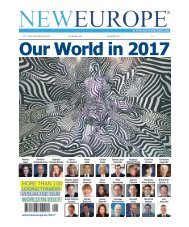Our World in 2018
Leading minds reflect on the state of our societies, and examine the challenges that lie ahead. An edition dedicated to generating ideas that will help form a new vision for our world.
Leading minds reflect on the state of our societies, and examine the challenges that lie ahead. An edition dedicated to generating ideas that will help form a new vision for our world.
You also want an ePaper? Increase the reach of your titles
YUMPU automatically turns print PDFs into web optimized ePapers that Google loves.
GLOBAL VS. LOCAL WORLDS
deal with Asian and African countries
out-competing the West on price,
because of a race to the bottom in labor
standards – a root cause of Western
wage stagnation.
The battle against environmental
degradation poses the same problem:
sustainable progress against pollution
cannot be made if nation-states fail
to take seriously their responsibilities
to reduce carbon dioxide emissions
and switch to renewable energy. Yet,
without concerted international action
to force free riders into line, pollution
will cross borders, and environmental
damage will spread and multiply.
So there is a limit to national-level
solutions. While it is sensible to oppose
the wrong kind of global cooperation,
the right kind of cooperation is vital
to achieve national prosperity in this
hyper-connected era. With market
power still expanding at the expense
of governments, policies focused
OUR WORLD | 2018
exclusively on pulling the levers of the
nation-state will fail to deal not just with
pollution and inequality, but also with
macroeconomic imbalances, beggarthy-neighbor
trade policies and their
spillover effects, cyber attacks, and
pandemics – each of which now poses
a transnational problem that requires
an international response.
Striking the right balance between
autonomy and cooperation
comes down to being clear about
the distinction between nineteenth- and
sovereignty. In the former, power is
centralized, held by a single state that is
seen as indivisible; the latter is focused
on popular self-government, with
citizens making their own democratic
choices about whether power resides
locally, nationally, or internationally.
In some areas, citizens will choose
their national government as sole
FLICKR / Lars Plougmann
decision-maker. In others, they may
choose to share decision-making power
in regional blocs like the European
Union or in international organizations,
such as the United Nations and NATO,
that agree to share responsibilities,
resources, and risks.
Getting the balance right is the
unstated issue at the heart of the
argument not just about the limits
and extent of global cooperation, but
also, and more immediately, about
the future of the UK’s relationship with
E.R
America First-style strategies, and overly
intricate frameworks of supranational
governance are all inadequate to
satisfy the modern world’s imperatives
to cooperate across borders and to
uphold the pride people have in their
distinctive national identities.
Striking the balance between
national independence and crossnational
cooperation will more likely
135










